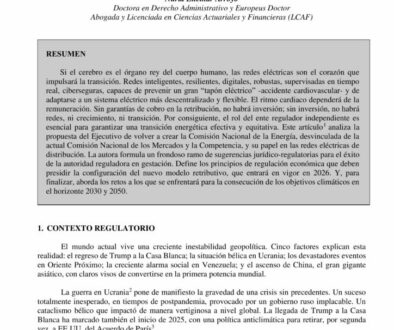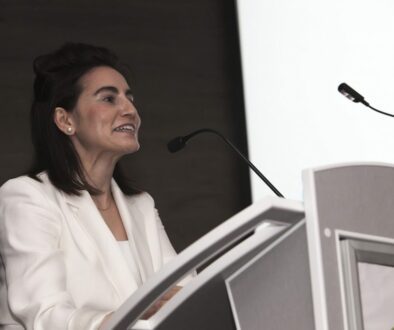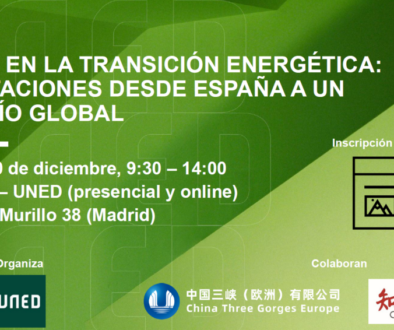COP28 hacia un “Acuerdo Climático Global” para una transición energética justa. Vicente López-Ibor en NJ.COM
COP28 towards a ‘Global Climate Deal’ for a just energy transition
As the world wilts under a summer of extremes – exceptional rain, wildfires and floods in most major regions of the world killing dozens and displacing thousands – it’s hard to deny that we are already facing dangerous climate change.
We are on the brink of a point of no return. Over the next five years we will likely see global average surface temperatures stray above 1.5 degrees Celsius (C), widely agreed by scientists to be the safe limit beyond which we risk triggering potentially irreversible and catastrophic climate impacts such as the collapse of the polar ice sheets, rising sea levels and abrupt melting of permafrost. While temperatures could fall back again, the window of opportunity to step back from the climate precipice is closing fast.
The upcoming UN COP28 climate negotiations to be hosted this December in Abu Dhabi therefore offer the last best chance for governments to reach a set of climate deals that could avert climate disaster and stay within 1.5C. The stakes could not be higher.
But the Summit has come under fire from politicians and climate campaigners due to being chaired by the UAE, the world’s third largest oil producer. The announcement of Dr Sultan Al Jaber, who heads up the UAE’s national oil company ADNOC (Abu Dhabi National Oil Company), as head of the upcoming climate talks has sparked an anti-COP backlash over concerns the talks will end up saving fossil fuel interests at the expense of the planet. These are crucial concerns, but that doesn’t mean giving up on the COP negotiations. Instead, COP 28 should be seen as a unique opportunity for understanding between different industries and geopolitical challenges, achieving a global deal that prioritises the decarbonisation of the planet as a paramount common goal.
That’s because much of the backlash, though rooted in admirable values, needs to understand the profound complexities of the energy transition. The harsh lesson Russia’s invasion of Ukraine taught us is we cannot afford to suddenly and immediately end consumption of fossil fuels, even in spite of the extraordinary work of EU on their green goals.
With fossil fuels supplying some 78% of the world’s energy needs, it’s neither realistic nor honest to deny that we will need to continue relying on oil and gas production for many years to come. However, it is important that fossil fuel industries evolve faster to the demands of decarbonisation. The decarbonisation scenario is the only in which we can attain the goal of climate neutrality.
At the same time, we must acknowledge that the transformation of the global energy system as we shift to solar, wind and electrification is inevitable. By 2030, about a third of global power will come from solar and wind. We must be clear that our future is one based on a clean energy ecosystem.
But here is where the crunch comes. We are not scaling renewables fast enough to avoid dangerous climate change. Yet we are still moving at a pace for which most governments are deeply unprepared. The rapid rise of renewables means that oil and gas production will decline. While good news for the climate, without planning it could lead to unprecedented economic uncertainties.
This anti-climate ‘greenlash’ is already starting. Just this May, a law was enacted in Florida that prevents state and local officials from using public funds for environmental, social and governance (ESG) objectives.
Thankfully, there is positive pushback. On August 14, 2023, the Montana First Judicial District Court issued a judgment recognising that prohibitions of analysis of greenhouse gas emissions and climate impacts violates fundamental constitutional right to a clean and healthful environment, which includes climate as part of the environmental life-support system.
That is why the UAE environment minister’s call earlier this year to “phase out oil and gas in a just way” is absolutely right. COP28 president Dr Sultan Al Jaber is also calling for a global deal to triple renewable energy production by 2030, and then double it again by 2040. Such a deal would be a huge first for the UN Summit that accelerates the clean energy transition, which should be a very positive straightforward.
For the first time, a global deal on increasing renewables has been put high on the COP agenda. Stakeholders must ensure it is based on the climate principle of common but differentiated responsibilities (CBDR) – recognising that all governments are responsible to address environmental destruction, but in ‘just transition’ terms.
So, we need a historic coalition between fossil fuels and renewables to make the global transition to a fully clean energy future succeed. Emerging renewable energy industries need capital and logistics to scale, which the oil industry can provide. And the oil industry must ramp up renewables to fully decarbonise by incorporating net-zero commitments in their business plans – and delivering them.
Many point out that carbon capture, usage, and storage (CCS) – designed to capture the carbon emissions from fossil fuel and industrial production – is undoubtedly costly. But this is too simplistic. New research reveals case studies of CCS increasing production costs by 1%, while reducing carbon emissions by 51%.
While both economic and energy costs are currently significantly high, this is where partnership between renewables and fossil fuels can be most fruitful. Powered by fossil fuels alone, reducing the costs of CCS will be challenging. But what if we power CCS using cheap, clean renewables?
As renewable energy generation accelerates, we can use it to cheaply power the CCS technologies by which to capture carbon emissions from the process of producing and refining oil as well. Increasingly researchers are showing that integrating with solar power is an economically viable path to scale-up CCS.
Energy companies need to accelerate a ‘just transition’ journey – this will have the added benefit of lowering their financial risk profiles and lowering the costs for other stakeholders too. At COP28, we have the opportunity to secure a new Global Climate Deal that mobilises all possible technologies, green solutions, and ventures with a view to reach full decarbonisation and a truly circular economy across all value chains; and which enshrines a strong commitment to governance, regulation and effective financing mechanisms for developing nations. And to execute such a deal, we need COP28 to launch an International Commission of High-Level Experts who can help lead, supervise, and assure its fulfilment.
A new clean energy system is emerging. Which is why at COP we must overcome polarisation and build a strong coalition between stakeholders – from governments to citizens, from large corporation to newcomers, from oil and gas to clean energy sources and solutions. A consensus for strong leadership in clean energy.
Bio: Professor Vicente López-Ibor Mayor is an internationally distinguished energy and climate expert. He holds a PhD in Law and is also a graduate of Harvard Business School and IESE. He is former co- founding Chairman of Europe’s largest solar energy company, Lightsource. He was a founding Member of the European Council of Energy Regulators, a Special Advisor to the Commissioner of Energy, Transports and Institutional Affairs of the European Commission, a Special Advisor to UNESCO’s Energy Programme, and a Commissioner of the National Energy Commission of Spain. He is currently co-founding Chairman of Ampere Energy and President of FF Ventures. He is also currently President of EFELA (European Federation of Energy Law) and President of EJI López-Ibor Abogados.
Text content




